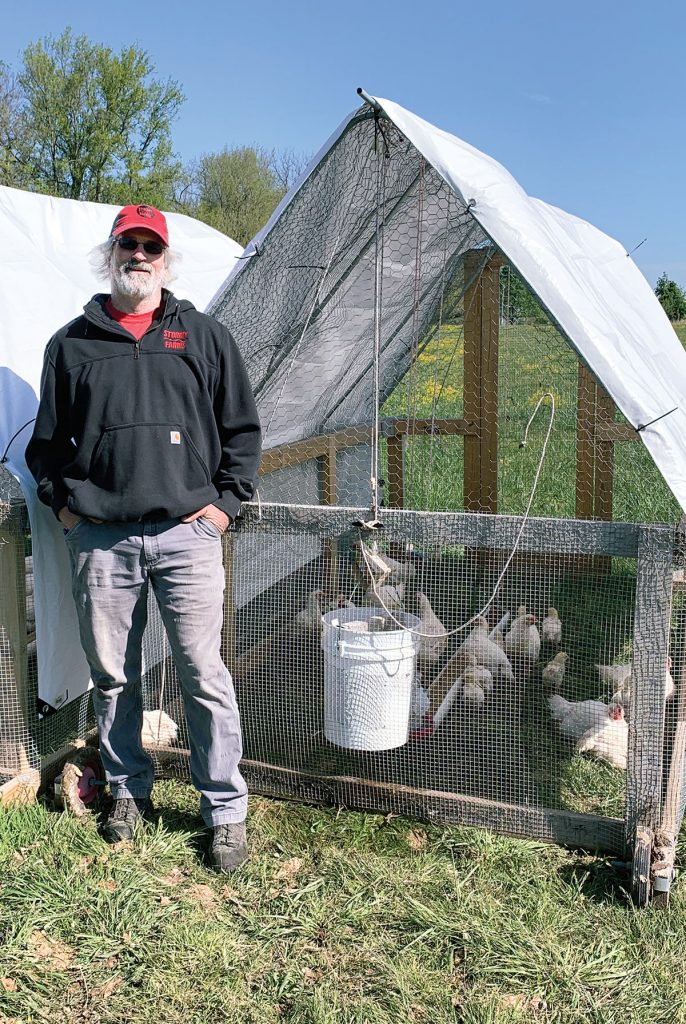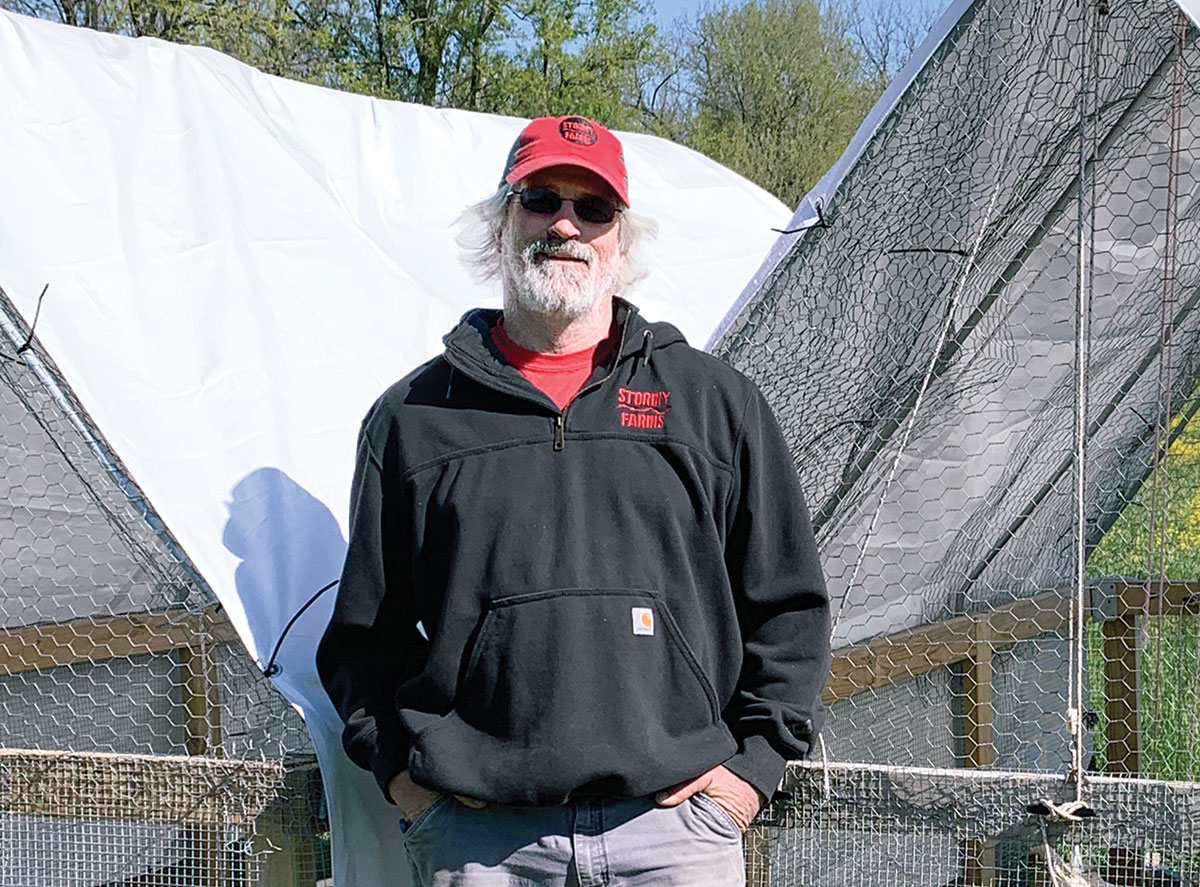
The Cooper family took a vacant farm and transformed it to Stormy Farms
Sam Cooper grew up sharing time with his parents between Republic, Mo., and Santa Cruz, Calif. In Missouri, he worked on a dairy farm and after graduating high school, enrolled in the Army, serving for 22 years.
In 2015, Sam’s wife Joanie encouraged him to re-establish contact with his adopted dad Ted Watkins, who lived in California. Sam took her advice and met up with Ted in Carthage, Mo. During the visit, Ted took Sam out to his farm and asked him if he had any interest in running it.
“It’s been a dream of mine since I was a kid,” Sam said. “So of course I jumped on it.”
No one had done anything with the house or the farm for more than 10 years. Ted had originally bought the farm 30 years ago for his brother who started a dairy farm, but when his brother died the farm was left vacant.
In August 2017, Stormy Farms in Carthage, Mo., became an unexpected opportunity for Sam and Joanie. Sam decided to name the farm after his late sister Julia (Stormy) Storm Cooper-Watkins who passed away at the age of 26 while Sam was stationed in Korea.
With this grand opportunity, Sam and Joanie started working on the farm right away by remodeling the house, cleaning out the trees and putting up fence.
“It was a blessing in disguise,” Sam said. A former deputy sheriff, Sam continued to work as a truck mechanic in Springfield, Mo., until March 2019 when he was able to come to the farm full time.
Stormy Farms is 260 acres, with the main 73 acres where they live and raise their animals and vegetables. The other two farms are used for hay production. The Coopers have been trading their hay for cattle in hopes of one day running animals on all their farm ground.
The farm is mostly based on organic and non-GMO farming practices. They currently have 500 chickens, 50 hogs and four cows. Most of the chickens are broilers with some laying hens. The hogs are mixed Hampshire’s, Large Blacks and Gloucestershire Old Spots, and the cattle are mixed Angus and Hereford. All of the animals are raised non-GMO and on pasture.
The chickens live in chicken tractors and are moved daily, never being on the same piece of ground twice in one year. The cattle are almost 100 percent grass fed but get a pound of cubes that are 18 percent protein and non-GMO, mainly just to get them accustomed to people more than a feed source.
Their pasture for the hogs and cattle contains fescue, clover, field peas, oats and a cover crop mix.
They look for healthy cattle in their breeding stock to provide a quality meat for their customers. The cattle are not vaccinated, nor do they have added hormones. Antibiotics are only given as a last resort. Their chickens, hogs and cattle are all butchered and sold at the farmers markets in Webb City, Mo, and Springfield, Mo. They also sell organic eggs.
Sam takes care of the animals while Joanie tends to the garden. Joanie’s son Justin Yancey also helps with the farm chores. Joanie maintains the farm’s website, Facebook page and all phone orders. They hope to start online orders in the next couple years.
Collecting rainwater for the animals is just one way they have taken advantage of every opportunity natures provides.
“Chickens put nitrogen back in the soil, cows put manure in the soil, and we want to use everything as effectively as possible rather than depleting the ground,” Sam said.
They want to get the microbiome in the ground back up and running since nothing has been done on the farm in a long time. They use hydroponics to grow fodder, which is barley seed they sprout, and all the animals love. It takes about 10 days from start to finish when it is then ready to feed.
This year they are expanding their garden in hopes of selling vegetables at the farmers market. They have applied for a high tunnel grant from the USDA and want to incorporate a no-till garden system. The seeds are locally sourced with vegetables started in trays inside and others in the ground outside. The seed trays are set in other trays filled with water so that the plants pull water as needed. The garden consists of organic soil amendments such as peppermint to keep bugs off plants.
They farm with a small 55-horse tractor and a few implements. Sam said he wants to provide as low disturbance as possible to nature and let the ground do the work for them. Being a regenerative farm is important while respecting the ground.
Sam has limited knowledge of how to run a farm but has learned a lot from Youtubers and believes if you watch animals and the ground, they will tell you what they need.
“It’s a learning curve. Every farm is different. There is no one solution,” he said. “You can go to another farm and see how they do things but unfortunately because the land, terrain, and vegetation is different it is just not the same. “You can’t run one farm exactly like you run another.”
Trying to build the farm and get into the community has been very difficult.
“The farm community is very close-knit. You have to gain their trust and earn your right to be there. Their trust is not given freely but I wouldn’t want to be a part of a community that would accept people just because they showed up.”
The Cooper’s believe it is important people know where their food comes from. They hope to incorporate transparency into their farm through future tours.







